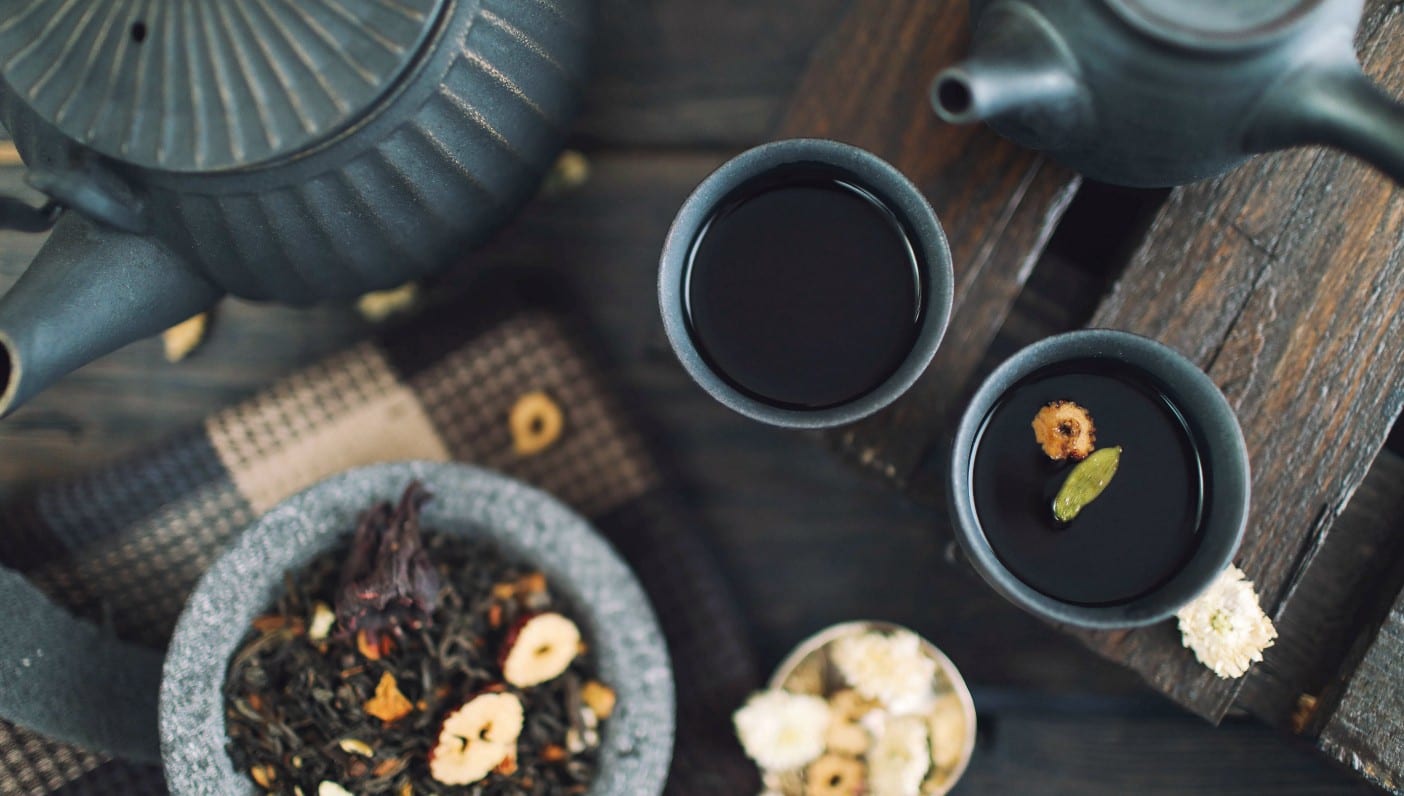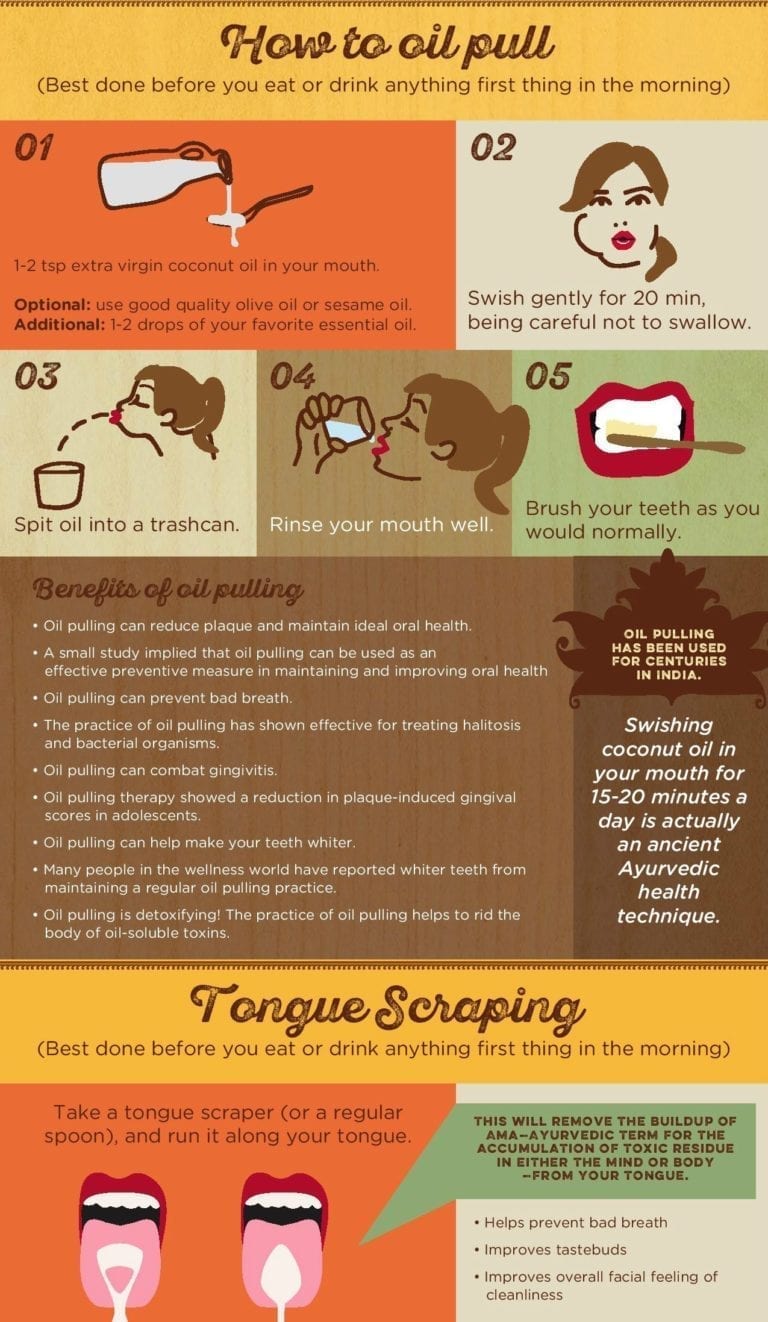
Like many Westerners without family roots in Eastern tradition, the first experience I had with Ayurveda was during a yoga teacher training. I took a dosha quiz (turns out, I’m tri-doshic), experimented with oil-pulling and self-massage, and got in the habit of starting every day with salted lemon water. Yes, the oil-pulling cleaned my teeth, and the lemon water got my system moving, and the self-massage felt darn good… But more than that, these seemingly simple additions to my morning routine provided a consistent practice of tuning into my body before my day really got going.
According to certified Ayurveda practitioner, health coach, and yoga teacher Marc Holzman, the process of tuning into your body is ultimately an act of love. „An organic curiosity or desire to study something—anything—arises first from a deep well of love for it,“ he says. „Cultivating self-love is critical to sustaining a lifelong practice of self-study. Without the love, you will avoid self-inquiry over and again. To know you is to love you,“ says Marc. „And vice versa.“
Curiosity Breeds New Routine
Often called the „sister science“ of yoga, Ayurveda is a the world’s oldest medical system, founded in India. It maintains a holistic approach. The three doshas correspond to what Ayurveda terms as the five elements of a human body: Vata (space/air), Pitta (fire), Kapha (water/Earth). Ayurvedic principles maintain that all illness and other physical ailments result from an imbalance of these elements in a person’s body. A person can maintain balance of the doshas primarily through diet—though there’s not one diet that’s good for everyone. What works is determined by self-study and experimentation. Another major way to maintain doshic balance is through Dinacharya, the practice of a daily routine.
„I’ve been teaching a course on Ayurvedic Daily Habits (aka Dinacharya) for six years now,“ says Marc, „and what I’ve learned is that in order to replace old, stubborn habits with new, life-enhancing ones, it takes more than just raw discipline and willpower. It takes love.“ It takes love, of course, because changing routines and committing to new ones requires patience and compassion with oneself.
Marc felt this kind of frustration when he was first experimenting with these daily habits and a new morning routine. „When I first committed to Dinacharya I was overly strict, resentful of the process and suffered many frustrating setbacks. It felt like such an obligation,“ says Marc. His teacher encouraged him to approach the routine through the lens of self-love rather than self-judgement. „If we are tense, rushed, distracted, or result-oriented while we do our morning practices, forget it!“ says Marc. „It’s not sufficient to go through the motions of a healthy daily routine. We need to be willing to fall in love every morning.“
Getting Intimate with Yourself
Ayurvedic morning rituals can include super simple routines, some of which may replace other forms of chemical-driven self-care. Marc’s favorite is abhyanga, oil massage. The practice of abhyanga is to spend a few minutes rubbing oil on your body every morning. He swears by taking at least five minutes every day to give himself a massage—“using your own hands to sculpt, rub, investigate, and heal your own body builds cohesion, integrity and trust in your body/mind,“ says Marc. „My cells come alive and begin communicating.“
He notes that the Sanskrit work for Love and Oil is the same: sneha. You can use any kind of oil, though different oils are recommended for the three doshas: traditionally a warming sesame oil for Kaphas and Vatas, and a lighter oil like sunflower or coconut that can stand the heat for Pittas. „Feeling into my own body with my own hands has made me my own best self-care giver,“ says Marc. „It’s a daily act of love that’s free and simple.“
A Mindful Mouth Routine
There are so many Ayurvedic rituals that can replace chemical-laden routines for self-care, says Marc, but they all begin with getting up early (think pre-6am, depending on your dosha and your location). A major component of Dinacharya involves oral hygiene. Here’s Marc’s prescription (See below for a fun infographic on how to oil pull and tongue scrape!):
- Use a stainless-steel tongue scraper every day upon waking. It cleans the tongue, clarifies the taste buds, and stimulates the organs (your organs are mapped out on the tongue)
- Oil pull
- For rinsing your mouth, keep a bottle of water on your sink with one drop of essential oil each of peppermint, lemon and melaleuca (tea tree). Toss the Listerine!
- Rub sesame oil on your gums with your index finger before bed. It nourishes your gums by enhancing circulation

But Why?
Ayurvedic routines like these yield more than physical benefits. In Ayurveda, different „selves“ are referred to as koshas. In traditional yoga, we recognize our physical self, of course, and our intuitive and emotional body. Ayurveda identifies five unique but interdependent koshas that each affect each other. In addition to our physical and emotional bodies, there’s the body responsible for our sensory and motor activities, our thought energy (the manomaya kosha); there’s a subtler body responsible for intellect (the vijnanamaya kosha—vijnanamaya translates to „the power of discernment“); and an even subtler body made up of pure joy, known as the anandamaya kosha.
„When we deeply understand and care for the physical body,“ says Marc, when we’re „eating and sleeping well, breathing deeply, and exercising regularly, our intuitive/emotional bodies become more clear and available. We begin to make better life choices.“ Marc identifies three main physical choices that are influenced by our emotional or intuitive choices:
- How you take care of yourself
- How you spend your time
- How you devote your life
On the flipside, says Marc, „abusing the body can set off a pattern of degeneration by clouding your intuition and decision-making process.“ When you neglect the physical body, your thought patterns can become contracted, which inhibits not only your emotional intelligence, but also your evolution as a whole.
The best thing about the awareness around Ayurveda is that it’s not complicated or time-consuming. The routines you implement don’t need to be costly, and don’t require special equipment or clothing. „Introspection doesn’t always require an hour with a journal,“ says Marc. „Often, it’s just a breath away.“
As is good health. In all senses of the word.
—
 Lisette Cheresson is a writer, storyteller, yoga teacher, and adventuress who is an avid vagabond, homechef, dirt-collector, and dreamer. When she’s not playing with words, it’s a safe bet that she’s either hopping a plane, dancing, cooking, or hiking. She received her Level II Reiki Attunement and attended a 4-day intensive discourse with the Dalai Lama in India, and received her RYT200 in Brooklyn. You can find her on Instagram @lisetteileen.
Lisette Cheresson is a writer, storyteller, yoga teacher, and adventuress who is an avid vagabond, homechef, dirt-collector, and dreamer. When she’s not playing with words, it’s a safe bet that she’s either hopping a plane, dancing, cooking, or hiking. She received her Level II Reiki Attunement and attended a 4-day intensive discourse with the Dalai Lama in India, and received her RYT200 in Brooklyn. You can find her on Instagram @lisetteileen.